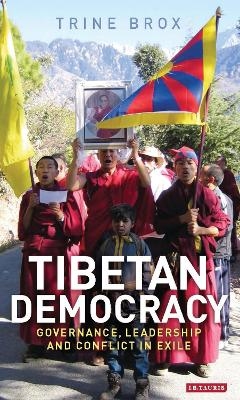
Tibetan Democracy
Governance, Leadership and Conflict in Exile
Seiten
2016
I.B. Tauris (Verlag)
978-1-78453-601-5 (ISBN)
I.B. Tauris (Verlag)
978-1-78453-601-5 (ISBN)
Feeds into wider debates on democracy and how practises of democracy differ across communities.
How do you govern 130,000 people from exile? Tibet - and the struggles of diaspora Tibetans - are elements of an ongoing and highly debated issue. The Dalai Lama's democratisation process during his time in India from 1959-2011, and the subsequent election of Lobsang Sangay as prime minister-in-exile, marked to the Tibetan people the move away from a seemingly feudal societal structure and traditional theocratic governance. Central to these Tibetan democracy aspirations is the 'freedom struggle' in which Tibetans dream of an ideal politics which includes both Tibetans residing in Tibet and those in exile, with the ultimate goal of returning to a self-ruled Tibet. However, some have questioned whether the fight for democracy has helped or hindered a united and free Tibet. To elucidate this complex debate Trine Brox has undertaken extensive fieldwork investigating how democracy is viewed and practised amongst Tibetans in exile. In so doing, she explores how the Tibetans living in India imagine, organise and negotiate governance that is modern and democratic, but uniquely Tibetan. This is an important book for those with an interest in Tibet, diaspora communities and democracy.
How do you govern 130,000 people from exile? Tibet - and the struggles of diaspora Tibetans - are elements of an ongoing and highly debated issue. The Dalai Lama's democratisation process during his time in India from 1959-2011, and the subsequent election of Lobsang Sangay as prime minister-in-exile, marked to the Tibetan people the move away from a seemingly feudal societal structure and traditional theocratic governance. Central to these Tibetan democracy aspirations is the 'freedom struggle' in which Tibetans dream of an ideal politics which includes both Tibetans residing in Tibet and those in exile, with the ultimate goal of returning to a self-ruled Tibet. However, some have questioned whether the fight for democracy has helped or hindered a united and free Tibet. To elucidate this complex debate Trine Brox has undertaken extensive fieldwork investigating how democracy is viewed and practised amongst Tibetans in exile. In so doing, she explores how the Tibetans living in India imagine, organise and negotiate governance that is modern and democratic, but uniquely Tibetan. This is an important book for those with an interest in Tibet, diaspora communities and democracy.
Trine Brox is associate professor at the Department of Cross-Cultural and Regional Studies, University of Copenhagen. A specialist on Tibet, she is co-editor with Ildiko Beller-Hanns of On the Fringes of the Harmonious Society: Tibetans and Uyhurs in Socialist China (Copenhagen, 2014).
CHAPTER 1. TIBETAN EXILE, DEMOCRACY AND TRANSLATION
CHAPTER 2. THE DALAI LAMA AND AUTHORITATIVE SPEECH
CHAPTER 3. THE MODEL SETTLEMENT
CHAPTER 4. DHARAMSALA DEMOCRATS AND ORGANISATIONS
CHAPTER 5. A PLACE FOR BUDDHISM IN DEMOCRACY?
CHAPTER 7. FREEDOM STRUGGLE OVER DEMOCRACY
POSTSCRIPT
| Erscheint lt. Verlag | 10.6.2016 |
|---|---|
| Zusatzinfo | 1 map, 7 bw integrated, 3 tables |
| Sprache | englisch |
| Maße | 138 x 216 mm |
| Gewicht | 644 g |
| Themenwelt | Sozialwissenschaften ► Politik / Verwaltung ► Politische Systeme |
| ISBN-10 | 1-78453-601-6 / 1784536016 |
| ISBN-13 | 978-1-78453-601-5 / 9781784536015 |
| Zustand | Neuware |
| Haben Sie eine Frage zum Produkt? |
Mehr entdecken
aus dem Bereich
aus dem Bereich
über Alltagsorte des sozialen Zusammenhalts
Buch | Softcover (2024)
transcript (Verlag)
CHF 33,55


